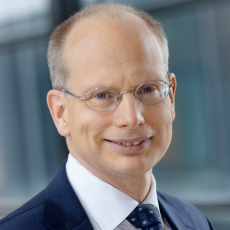You are in the business of helping companies decarbonize - is the world moving fast enough in this direction? If not, what do you see as the main bottlenecks?
I'm afraid the short answer is no, we're not on track to reach the Paris Agreement, for example. In terms of technologies and capital, we have everything we need, but what is lacking is a regulatory framework that channels business cases for these investments. Another obstacle, particularly in the marine sector, is that we need to ensure that fossil fuels and green fuels have an equal playing field. Currently, the latter are two to four times more costly - for this balance to be achieved, carbon taxes and other measures will be required.
Businesses and regulators must engage in dialogue, as you have previously stressed - do you see this dialogue increasing as the need to transition accelerates?
Absolutely. We're talking about entire ecosystems transforming as part of this transition, and in order to make that work, we need a much deeper dialogue. Wartsila has a saying: green is not black or white. There are no simple solutions and to come even close to the Paris Agreement we need to leverage a broad array of solutions, carefully evaluating what is right for each country or region.
Although technology is there, it's not well known, which means you need to transfer a lot of knowledge and confidence in it. Wartsila is an important player in its field, but we cannot do it alone. Because of this, we recognize that we must engage much more in dialogue with stakeholders of our two ecosystems, energy and marine. Our operating style changed as a result, as we became quite active publicly to reach out to other ecosystem players.

If we look back 10-15 years ago, the biggest secret in our company was when we were launching a new product. This approach was necessary to keep an advantage against competition. The logic has now completely flipped - we have announced, for example, that we will have the ammonia concept ready in 2023 and 100% hydrogen in 2025, to signal to the ecosystem that we are coming with our piece of the puzzle.
Whatever fantastic technology we develop is not going to help unless we have the right fuel for it, and then there is no impact on the world and no business for Wartsila.
Wartsila offers a variety of green solutions, from engines that are using future fuels like hydrogen to energy storage and hybrid power plants optimization - where do you see most demand coming from nowadays?
Different geographies require different solutions. In broad terms, we must add a lot of renewables - as we do that, we will need more balancing power, and then we can ramp down the big coal plants. Then, we introduce green fuels for balancing engines, and finally, we run the entire system on green fuels. All countries will go through this process, but at different speeds.
As of right now, we are finding the highest interest in the US and UK, as well as Australia. Continental Europe is also experiencing a growth in demand, not only as a result of the Paris Agreement, but also for reasons of national security. These are two very compelling arguments for increasing the focus on renewable energy. China and India have been making great strides on battery storage, although they are at an early stage.
What type of solution do you have for making the marine industry more sustainable?
Clearly, the marine sector plays an important role in decarbonization, but it's important to remember that it accounts for just 2% of global CO2 emissions, while the energy sector accounts for 30-35%. Moreover, shipping is by far the least carbon-intensive mode of transport, compared to trucks, for example - ships are responsible for 90% of global trade and only 10% of transportation carbon emissions. Though maritime needs to evolve, it shouldn't be viewed as the main culprit.
Nevertheless, we're doing our best to decrease its impact even further. New green fuels are being developed (biofuels and methanol are already on the market, and we are launching ammonia in 2023 and 100% hydrogen in 2025) - these fuels will be gradually blended in because they will not immediately be available all over the world. We can also reduce the impact by using less energy on the vessels themselves. Various energy-saving devices, such as air lubrication systems and propulsion optimization, can accomplish this. Another bucket will be carbon capture solutions, which we are developing and will launch in a couple of years - we need to capture emissions, store them on the vessel, transport them back to shore, then do something with them, so once again it’s an ecosystem that needs to evolve. Digital solutions are a fourth bucket - using technology to optimize fleets. Often, vessels travel all over the world and then wait for two weeks in harbors due to congestion. By planning better and avoiding waiting times, we could save both fuel and time.
Do you have a final message for our global readership?
Green is not black or white, there are no simple solutions. And while the shift will be gradual it doesn’t mean it has to be slow. We only have one planet, and we are all responsible for taking care of it for the future generations.





